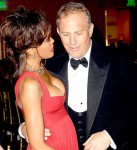Sound & Vision: Life After Whitney: Why We Should Appreciate the Greats While They're Still with Us
posted in: Pop
 There’s a scene”actually, several of them”in the 2011 film My Week with Marilyn in which an insecure Marilyn Monroe (exactingly detailed by Oscar nominee Michelle Williams) gets an ego boost from Susan Strasberg, her acting coach. You’re a great actress, Strasberg insists, on repeat, as if that makes it fact.
There’s a scene”actually, several of them”in the 2011 film My Week with Marilyn in which an insecure Marilyn Monroe (exactingly detailed by Oscar nominee Michelle Williams) gets an ego boost from Susan Strasberg, her acting coach. You’re a great actress, Strasberg insists, on repeat, as if that makes it fact.
It’s hard to watch the movie now and not draw parallels between Monroe and Whitney Houston, both haunted by demons, both under-appreciated at the end. Over the last decade or so of Houston’s life, as her career and reputation nosedived, someone in her camp probably was doing the same thing for her.

There was a publicist at her record label, Arista Records, who downplayed Houston’s personal drama in the late ’90s when I asked if the drug rumors were true. “Yes,” the rep admitted. “But it’s not as bad as they say it is.” Then came the Strasberg moment: “She’s still amazing.”
During the week following Houston’s April 11 death, that’s what everyone said”only in past tense. As the tributes poured in, Houston wasn’t around to hear the thunderous praise. She had become yet another cautionary tale of what substance abuse can do to a sparkling image and red-hot career and how, sometimes, death is the only thing that can restore their luster.
We will always love her now, even if, in her final decade, many of us barely showed her any love. Some might say Houston got the coverage and reputation she deserved. Too bad it took her death to remind many of us how much she’d contributed to pop and to the soundtrack of the ˜80s and ˜90s.
Death becomes fallen stars. Michael Jackson’s singles and albums re-entered the charts in the weeks after he left us in 2010. Etta James saw significant chart action for the first time in decades after she passed away on January 20. And Houston finally had the hit single that had eluded her all of this century, as “I Will Always Love You,” which had spent 14 weeks at No. 1 in 1992 and 1993, re-entered Billboard’s Hot 100 at No. 7, three notches above Madonna’s new single, before ascending upward to No. 3.
Before her death, I can’t recall the last time I’d read anything positive about Houston. Most of the articles focused on her drug issues and her shaky performances, accompanied by the most unflattering photos advertising and circulation revenue could buy. But once she was gone, the songbird’s wings were restored. Now that a few weeks have passed, and once the autopsy report is in, perhaps the media will tip the delicate balance and return to slamming her.
 As I watched the outpouring of grief, I thought about all of the under-celebrated greats who are still with us, particularly the soul divas of Houston’s heyday, the Shirley Murdocks, the Miki Howards, the Stephanie Mills, the Angela Winbushes. If the deaths of Teena Marie, Vesta Williams and now Whitney Houston have taught us anything, it’s that great voices may live forever, but the bodies that contain them don’t. They sang the songs that make us think, “Those were the days.” Will Katy Perry’s latest single inspire that kind of reaction in 2037?
As I watched the outpouring of grief, I thought about all of the under-celebrated greats who are still with us, particularly the soul divas of Houston’s heyday, the Shirley Murdocks, the Miki Howards, the Stephanie Mills, the Angela Winbushes. If the deaths of Teena Marie, Vesta Williams and now Whitney Houston have taught us anything, it’s that great voices may live forever, but the bodies that contain them don’t. They sang the songs that make us think, “Those were the days.” Will Katy Perry’s latest single inspire that kind of reaction in 2037?
Unlike Murdock, Howard, Mills, Winbush, Marie, Williams, and too many others, Houston got her due, paid in full”for a time. One of the great tragedies of Teena Marie’s death in December of 2010 is that such a supremely gifted singer-songwriter was known to the masses for one song only, “Lovergirl,” a Top 5 hit from 1984. Vesta Williams never even got above No. 55 on the Hot 100. Can we get an Amen for the others while they’re still around to hear it?
Unsung, TV One’s Behind the Music-style series that pulls under-sung former soul stars out from mothballs, is a great start, but don’t ˜80s R&B hitmakers like Evelyn Champagne King, Ray Parker Jr. and Freddie Jackson”all of whom have been featured on Unsung”deserve the same mainstream coverage as Adam Ant, whose Australian comeback tour was recently featured on the front page of The Australian daily newspaper?
 Yes, at least Houston had her day. I’ve been recalling anecdotes about her from my early years as a magazine writer and editor in New York City. At a listening release party for the Waiting to Exhale soundtrack in 1995, Babyface, who’d written and produced most of the album, called Houston “the greatest singer of all time,” a sentiment that was seconded over and over after her passing.
Yes, at least Houston had her day. I’ve been recalling anecdotes about her from my early years as a magazine writer and editor in New York City. At a listening release party for the Waiting to Exhale soundtrack in 1995, Babyface, who’d written and produced most of the album, called Houston “the greatest singer of all time,” a sentiment that was seconded over and over after her passing.
 Brandy, whom I interviewed for People magazine in 1994, when she was fifteen and still on her first single, stood firm in her admiration to the end. All those years ago, when I asked her whom she most wanted to meet, she told me how disappointed she had been with her one encounter with Houston. “She just shook my hand and said, ‘Nice to meet you. Good luck. Keep reaching for your dreams. It wasn’t anything personal, so in my mind, I haven’t met her yet.”
Brandy, whom I interviewed for People magazine in 1994, when she was fifteen and still on her first single, stood firm in her admiration to the end. All those years ago, when I asked her whom she most wanted to meet, she told me how disappointed she had been with her one encounter with Houston. “She just shook my hand and said, ‘Nice to meet you. Good luck. Keep reaching for your dreams. It wasn’t anything personal, so in my mind, I haven’t met her yet.”
Eventually, she’d not only get the meeting she wanted, she’d work with her, too, in the 1997 TV movie Cinderella. One of the most disturbing things I’ve seen on YouTube all year is a video interview with Brandy, Monica and Arista titan Clive Davis, who’d guided Houston to stardom, taped two days before her death.
In the clip, the singers talked about their upcoming performance at Davis’s annual pre-GRAMMY party, and about Houston, her talent and her supportive nature. They had no way of knowing how terribly wrong things would turn out, but, unlike much of the press”which, in recent years, had been more focused on Houston’s vices than her voice, unless it was to slam it for no longer being the powerful instrument it had once been”Brandy and Monica hadn’t wavered in their appreciation.
 Neither, to hear him tell it, did Kevin Costner, who spoke at Houston’s funeral at the New Hope Baptist Church in Newark, NJ. As I watched, though, I couldn’t help but wonder, what he had done for her lately. Perhaps Costner and Houston had maintained a tight friendship in the years after they costarred in The Bodyguard, but considering how infrequently they’d publicly acknowledged each other in the last twenty years, his final testimonial came out of nowhere. He’d saved her in The Bodyguard, he said. Why didn’t he do the same in real life?
Neither, to hear him tell it, did Kevin Costner, who spoke at Houston’s funeral at the New Hope Baptist Church in Newark, NJ. As I watched, though, I couldn’t help but wonder, what he had done for her lately. Perhaps Costner and Houston had maintained a tight friendship in the years after they costarred in The Bodyguard, but considering how infrequently they’d publicly acknowledged each other in the last twenty years, his final testimonial came out of nowhere. He’d saved her in The Bodyguard, he said. Why didn’t he do the same in real life?
It would have been a lofty aspiration for sure, but I’m sure he’s not the only one wishing he’d appreciated Houston more in her later years, even after her voice had become a show-stopper for all the wrong reasons. The moral of this story: You really don’t know what you’ve got until it’s gone. So celebrate life”and talent”today, while it’s still with us. You never know what loss tomorrow might bring.
